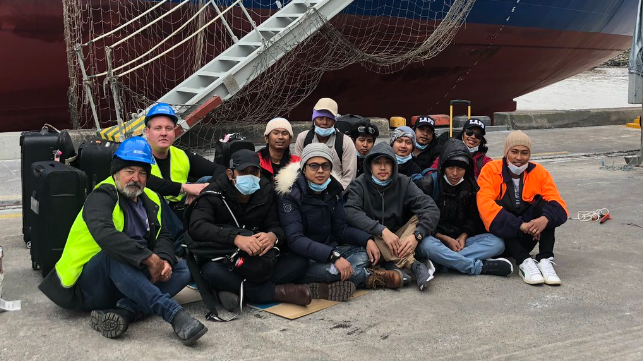World Human Rights Day: Human Rights Must be Upheld by Law

When Human Rights at Sea was established in April 2014, the concept of universal human rights applying at sea as equally as they do on land was not explicitly recognized across the wider maritime industry. After all, piracy was on the decline, slavery in the fishing industry was largely invisible to the public and cases of seafarer abandonment were under-reported. Any worker-related issues of the day were seen in the context of labor rights and business economics.
Then the number of migrants attempting to cross the Mediterranean escalated, and people were confronted with stories and images of people - sometimes children - being pulled from the sea. This forced consideration of universal human rights, such as: “Everyone has the right to life, liberty and security of person” and “Everyone has the right to seek asylum from persecution.”
Yet concern about human rights was mixed with concern about the potential economic and social impact of the influx. What effect might large numbers of migrants and refugees have on the host state? The issues polarized public opinion, created political tensions and raised concerns about the role of seafarers fulfilling their long-respected duty to rescue people in distress at sea, irrespective of their status.
The politicized agenda on migration and asylum in Europe led front-line European member states to pursue a rhetoric of criminalization of search and rescue by civil society NGO vessels, seen in the arrests of rescue ships and individuals and the de-flagging of SAR vessels.
The COVID-19 Pandemic
Fast forward now to 2020. The COVID-19 global pandemic has exposed glaring gaps in human rights protection and systemic and entrenched inequalities.
With the crew-change crisis, rights coming under the spotlight included: “Everyone has the right to … free choice of employment, to just and favourable conditions of work…” and “Everyone has the right to rest and leisure, including reasonable limitation of working hours and periodic holidays with pay.”
It also saw the extensive stress-testing of the Maritime Labour Convention (MLC) 2006 in a way most probably not envisaged at the time of its initial drafting and entering into force.
As a result of COVID-related travel restrictions, hundreds of thousands of seafarers have been stranded on board their ships, unable to return home whilst others were banned from joining ships. The enormity of the problem has been characterized by the UN Secretary General António Guterres as “a humanitarian and safety crisis,” and the UN chief has called all governments to assign seafarers “key worker status” during the pandemic.
On December 8, 2020, the ILO governing body called for urgent action on the seafarer crisis relating to COVID-19. It took the exceptional action of adopting a resolution to address the dire situation of seafarers trapped at sea because of the pandemic.
The ILO's ‘Resolution concerning maritime labour issues and the COVID-19 pandemic‘ has placed the issue of seafarer’s rights at the forefront of state consideration.
Importantly, the explicit highlighting of applicable human rights instruments and related protections has now been included in addition to MLC provisions. The key paragraph being: “Recalling relevant international human rights treaties and other instruments, including the Tripartite Declaration of Principles concerning Multinational Enterprises and Social Policy, according to which all multinational and national enterprises should respect human rights throughout their operations.”
Concern about human rights is mixed with debate about the potential economic and social impact of seafarers stranded on ships. What impact might sick or fatigued seafarers have on public health, on the safety of ships at sea and on global trade?
Fortunately, the shipping industry is now united on the need to protect seafarers’ human rights, but it has met resistance from governments and public health officials unwilling to allow crew changes because of these concerns.
The situation is yet to be satisfactorily resolved, but the importance of the industry recognizing that the concept of human rights at sea is distinct and important - beyond the context of labor negotiations and business risk - cannot be underestimated. It paves the way for better addressing the other human rights abuses that continue in the maritime environment, such as piracy, slavery, abandonment, discrimination and bullying.
The need for ‘human rights at sea’
Human Rights at Sea, as an independent civil society charitable NGO, has spent the last seven years defining, developing and sharing the legal and policy basis for addressing the explicit application and enforcement of human rights, and highlighting protection gaps throughout the maritime environment.
International human rights law offers an enforceable standard of conduct despite the social and economic pressures that can dominate public debate and challenge the inalienable rights of individuals.
Our NGO has been continuously working through research, advocacy, investigation and lobbying. Some of the key human rights deliveries to date include:
- The development of the Geneva Declaration on Human Rights at Sea
- The development of an NGO SAR Code of Conduct for the Central Mediterranean
- Publication of Deprivation of Liberty at Sea International Guidance
- The establishment of a Missing Seafarers and Fishers Reporting Programme
- Reporting on fishermen’s welfare and human rights abuses in the global fisheries sector in the Pacific

that matters most
Get the latest maritime news delivered to your inbox daily.
On International Human Rights Day, today and every day, we should all act in recognition of the first, universal human right: “All human beings are born free and equal in dignity and rights. They are endowed with reason and conscience and should act towards one another in a spirit of brotherhood.”
David Hammond is the CEO of Human Rights at Sea. He is a former English Barrister, military seafarer and retired Royal Marines’ Officer. He is an advocate for the on-going international development, advocacy and drive for the explicit codification of the concept of ‘human rights at sea’ throughout the maritime environment.
The opinions expressed herein are the author's and not necessarily those of The Maritime Executive.
